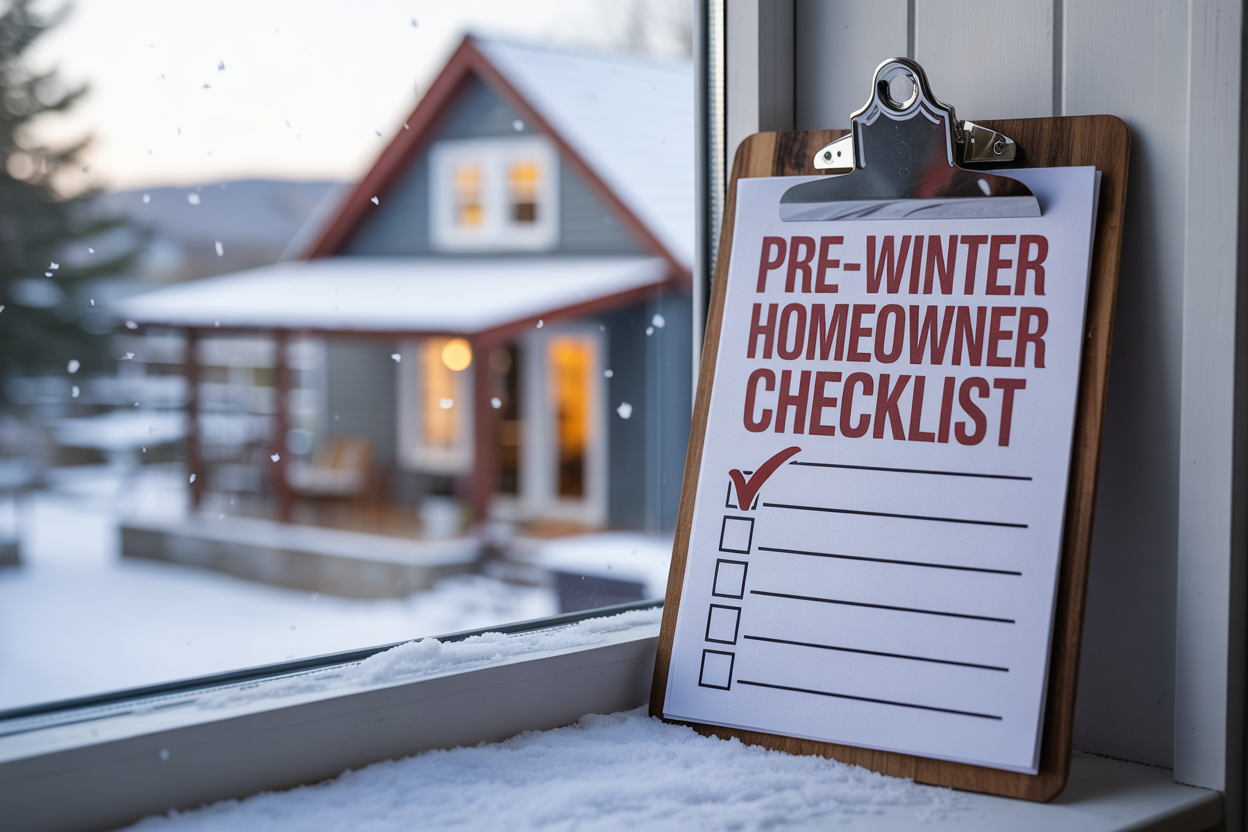As the vibrant autumn leaves give way to the impending chill, it's crucial for homeowners in the Brainerd Lakes Area to ready their properties for the demanding winter months ahead.
Here's a comprehensive checklist to ensure your home remains safe, efficient, and comfortable throughout the season.
Exterior & Roof
- Inspect your roof for any loose or missing shingles and address repairs promptly to prevent issues from heavy snow accumulation.
- Given the prevalence of ice dams in our region, consider installing or checking roof heat cables if you've encountered problems in the past.
- Clean gutters and downspouts thoroughly to avert ice backups.
- After removing debris, flush them with a hose to ensure downspouts are clear and not frozen.
- Evaluate attic insulation and ventilation.
- Proper airflow maintains a cold roof, reducing the risk of ice dams; adding soffit vents may be beneficial.
- Trim tree branches near your home.
- Heavy, wet snow can break limbs; ensure they're at least six feet away from the roof to prevent damage.
Heating & Energy Efficiency
- Schedule a furnace tune-up and replace the filter.
- Request your HVAC technician to check carbon monoxide levels, as furnaces work harder in sub-zero temperatures.
- Inspect and seal drafts around doors, windows, and outlets.
- On windy days, use incense or a lighter flame to detect leaks and seal them accordingly.
- Reverse ceiling fans to push warm air downward.
- Check your chimney and fireplace.
- Ensure the flue operates smoothly and have it swept if you burned more than a cord of wood last year.
- Stock up on firewood and pellets early, as prices tend to rise in late November.
Plumbing & Water Systems
- Disconnect and drain garden hoses, and shut off exterior spigots.
- Insulate exposed pipes in crawl spaces, garages, or basements.
- Foam pipe covers from local hardware stores are affordable and easy to install.
- Locate your water shut-off valve in case of a freeze emergency.
- Flush your water heater to remove sediment buildup, enhancing efficiency and lifespan.
Outdoor Preparation
- Store lawn furniture, grills, and hoses.
- Protect patio furniture by wrapping it in old tarps or shrink-wrap to prevent rust from moisture.
- Blow out sprinkler systems.
- Hire a professional or rent a compressor before the first deep freeze, typically in early November.
- Check your snowblower and stock up on fuel and shear pins.
- Run it once to ensure it starts without issues.
- Mark driveway edges with reflective stakes before the ground freezes to assist plow drivers and prevent lawn damage.
- Purchase ice melt (preferably pet-safe) before the first storm.
Garage & Vehicles
- Inspect tires for tread and switch to winter tires if possible.
- While all-weather tires suffice for most commutes, true winter tires offer better grip on icy mornings along Highway 371.
- Check antifreeze levels and wiper fluid; opt for freeze-resistant fluid rated to -30°F.
- Test your car battery.
- Cold cranking amps decrease in sub-zero temperatures; local auto shops often provide free testing services.
- Keep a winter emergency kit in your vehicle, including a blanket, gloves, flashlight, shovel, jumper cables, and snacks.
Interior Comfort & Safety
- Test smoke and carbon monoxide detectors.
- Replace batteries or install new units if they're over ten years old.
- Check window locks and storm windows.
- Add plastic window film if drafts persist.
- Adjust blinds and curtains to let sunlight warm your home during the day and insulate at night.
- Deep clean before sealing up the house.
- Vacuum behind radiators and vents to prevent dust from burning and causing odors when the heat is activated.
- Add rugs to cold floors, especially over concrete basements, to enhance warmth.
Bonus Local Tips
- Mice seek warm basements during winter.
- Seal cracks with steel wool and spray foam, and use peppermint oil or ultrasonic repellents near foundations to deter them.
- For boat or dock owners, remove docks and lifts before lake freeze, typically in late October, and grease moving parts before storage.
- Cabin owners should turn off water completely and pour RV antifreeze into drains and toilets to prevent burst pipes.
- Check propane tanks and fill them before temperatures drop below 20°F, as cold weather can delay refill response times in the area.
By diligently following this checklist, homeowners in the Brainerd Lakes Area can ensure their properties are well-prepared to withstand the harsh Minnesota winter, maintaining safety and comfort for their families. |

